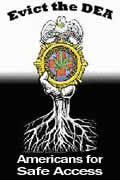The Washington State Medical Marijuana Act,
CHAPTER 69.51A RCW A Guide for Patients and Physicians
Return To OnlinePot’s Legal Section Main Page
The Washington State Medical
Marijuana Act
CHAPTER 69.51A RCW
A Guide for Patients and Physicians
Current as of June 1, 1999
The Washington State Medical Marijuana Act, which was created by the passage of
Initiative 692, creates an exemption in state law from criminal penalties for the
medical use of marijuana under certain, defined conditions. This brochure gives a
general description of how the act applies to Washingtonians. Be sure to speak
with a lawyer for an up-to-date interpretation and answers to any specific
questions you may have about your own situation.
(visit "http:/www.eventure.com/i692 " for updates and current information).
Remember, federal laws banning medical marijuana remain in effect. While federal charges are rarely brought for small-scale, personal possession or cultivation of marijuana, the protections of the Washington State Medical Marijuana Act do not fully immunize you from any punishment.
What does the Medical Marijuana Act do?
The Act changed how certain people–doctors, medical patients and their "primary caregivers"–will be treated by the state’s court systems. It did not legalize marijuana for recreational use. Patients with a qualifying diagnosis, and a physician’s recommendation for the medical use of marijuana, now have a legal defense against criminal prosecution in Washington state.
Physicians are exempt from state-level penalties for discussing the medical benefits of marijuana use with their patients.
If arrested by state or local authorities on marijuana charges, a qualified patient can claim immunity from prosecution under state law if he or she is using the marijuana for certain medical purposes. Because compliance is so important, it is imperative that patients take time to understand the new law.
Who is affected by the Medical Marijuana Act?
The Act was designed to protect seriously ill and terminally ill patients from state and local criminal penalties for using marijuana medically. Only people with a diagnosis of cancer, HIV disease, glaucoma, multiple sclerosis, spasticity disorders, and intractable pain (see specific definitions RCW 69.51A.010, Section 4, of the state law) are considered "qualified patients" and can take advantage of the law as a legal defense against marijuana charges.
A physician must judge whether marijuana is appropriate for treatment of a specific illness or symptom. Simply having a qualifying disease does not automatically qualify anyone for protection under the Medical Marijuana Act. Only a doctor’s recommendation, and documented discussion about the risks and benefits of medicinal marijuana use, will qualify a patient.
What is medical marijuana used for?
Marijuana has been used for centuries by doctors and patients all over the world. Some conditions for which science has shown medical benefits from marijuana include: Nausea reduction The most common medical application of marijuana is for the reduction of nausea–the extreme nausea caused by cancer chemotherapy and AIDS treatment, and even common nausea induced by standard medications for various ailments. Patients facing such treatments often find that just a small amount of inhaled marijuana can immediately quell nausea. Increasing appetite Marijuana also increases appetite for patients with nausea or other conditions, permitting more normal food intake and improved nutritional status and preventing dangerous weight loss. This is particularly important to both cancer and HIV patients. Controlling muscle spasms, seizures and chronic pain Marijuana is also used medically by patients with epilepsy, inflammatory bowel disease or Crohn’s disease, paralysis, arthritis, multiple sclerosis, spinal cord injuries and migraine headaches. Reducing eye pressure in glaucoma patients Glaucoma is a progressive disease of the eye which can lead to blindness. It results from a buildup of pressure within the eye. Marijuana reduces the pressure within the eye, holding off some of the damage.
(See the website "The Science of Medical Marijuana" at http://www.medmjscience.org for more information and the scientific background for these conditions)
Can patients get a prescription for marijuana?
No. Even though the Medical Marijuana Act is now law, it is still not possible to get a standard prescription for marijuana from a doctor. Pharmacies cannot carry marijuana because it is still illegal under federal law for use as a medicine.
Instead, the Act permits doctors to have a discussion with their patients on the risks and benefits of marijuana use in their medical treatment. If a doctor determines that the benefits outweigh the risks for their patient, then the doctor is allowed to state such in the medical record and provide a copy of such documentation to the patient. This medical documentation then serves as the basis for the legal defense against prosecution.
A marijuana recommendation should never be made lightly. If a patient is arrested or charged with a marijuana offense, the doctor may be required to testify. For this reason, the physician needs to be clear about the rationale for the recommendation, and should monitor the patient’s progress carefully.
How long does a doctor’s recommendation last?
For as long as the marijuana-recommending physician is in charge of the patient’s care, and for as long as the physician continues to believe that marijuana is helpful, the patient is protected under Washington state law. However, if a patient changes doctors, or if the recommending doctor changes his or her opinion of marijuana’s importance to treatment, the patient may not be protected any longer. Common sense suggests that the recommendation must be current to be valid when used as a legal defense, and therefore it should be periodically renewed.
Federal laws against marijuana–what a patient should know about their doctor’s legal risk.
After a similar measure passed in California, federal officials reminded physicians that it is illegal to prescribe marijuana. They have threatened California physicians with revocation of their federally issued license to prescribe drugs, cutoff from eligibility for the Medicare and Medicaid programs, and even criminal prosecution. Out of fear, many doctors have become reluctant to discuss medical marijuana at all. However, a lawsuit filed against the federal government by several California physicians and some patients and organizations has succeeded in eliminating most of the risk for physicians who recommend medical marijuana for the time being.
On April 30, 1997, Federal Judge Fern Smith issued a preliminary injunction in the case, Conant vs. McCaffrey, preventing the threatened punishments while the case proceeds to trial. Judge Smith’s injunction has a couple of important qualifiers: 1) The protection from federal penalties applies only to physicians treating patients with cancer, glaucoma, HIV disease, and/or "seizures or muscle spasms associated with a chronic, debilitating condition" and 2) The protection has a limit–doctors may not get involved directly in helping a patient to acquire marijuana. Judge Smith defined this limit as "criminal conduct" under federal law, meaning "aiding and abetting or conspiracy" to violate federal drug laws.
Because of the risks a doctor faces if he or she helps a patient obtain marijuana, patients should not ask their doctors to suggest a place or person from whom to obtain marijuana–obtaining it is the sole responsibility of the patient.
How to document a medical marijuana recommendation or approval from a doctor.
Federal officials have stated clearly that physicians and patients have the right to freely discuss the risks and benefits of medical marijuana (see Pearson vs McCaffrey). Judge Smith’s ruling went a step further, permitting doctors treating the conditions listed above to affirmatively recommend marijuana to their patients.
It is best if patients obey some limits in their discussion with doctors. In simplest terms, a patient should talk about their condition, talk about medical marijuana, but don’t talk about how or where they might obtain it.
What a patient needs most from their doctor is a professional medical opinion as to the possible usefulness of medical marijuana in their treatment. Patients should ask their physician to discuss the risks and benefits of medical marijuana for their particular case. Whether or not the doctor believes it might help, good medical practice requires the physician to record the fact that the conversation has occurred in the patient’s medical records. If the doctor recommends marijuana, patients should ask that it be recorded in their medical records, and should request a copy of their records. In addition, the Doctor could provide a letter to their patient indicating that in their opinion, the benefits of medical marijuana would outweigh the risks (see sample letter at the end of this document).
State law permits patients access to copies of their medical records.
Patients request copies of their medical records all the time, for a variety of reasons, and don’t need to explain why. Whether a patient requests copies of their records to be protected under the Medical Marijuana Act, or merely to keep in a private file at home, should be of no real concern to their doctor. If a patient requests copies of their medical records from their doctor’s office, they shouldn’t unnecessarily mention anything about their possible intention to obtain or grow marijuana. Patients should ask for the entire chart or record, not just sections pertaining to marijuana.
This copy of a patient’s medical records, indicating that they have a medical marijuana recommendation, will be the basis for protection under the Act. Patients should make copies and keep at least one in a secure place; they should also try to have one with them or with any marijuana they might come to possess later on.
How do patients obtain marijuana?
Due to Federal restrictions on medical marijuana, patients are unable to obtain it through a pharmacy. Selling marijuana remains illegal, but a patient who possesses marijuana upon a doctor’s recommendation is protected from state and local criminal penalties for possession under state law.
Under the Medical Marijuana Act, the cultivation of marijuana plants for the personal, medical use of a patient is permitted.
A person arrested and charged with cultivation under state law has the right to use a medical marijuana defense, if the cultivation was for personal use only, and if the person is a qualifying patient with a copy of their medical record documenting the physician’s discussion on medical marijuana. Cultivation of marijuana remains a felony under federal law. Federal agents are believed to be unlikely to arrest and prosecute small-time growers of marijuana for medial use because small-scale cases are not a high priority to federal law enforcement. Still, prosecutions by federal agencies are possible.
Cultivation guidelines
The Medical Marijuana Act addresses cultivation only for one’s own personal consumption. There is no concrete standard for numbers of plants, but there is a sixty-day supply limit written into the new law. If arrested, a patient may need to show that they do not possess more than is necessary for their personal sixty-day supply.
Patients are not allowed to give away, distribute or sell marijuana under any circumstances to anyone. Any evidence of such distribution puts a person at very high risk. The Medical Marijuana Act defense will not work for someone who distributes or sells any amount of marijuana, because the new law applies only to a patient’s personal medical supply. If prosecutors discover evidence of sale or distribution, they can charge a person with felony counts that could result in years of prison time, regardless of that person’s medical condition or medical authorization to use marijuana.
If a patient is caught, how does the Medical Marijuana Act protect them?
If a qualified patient is caught with marijuana, they have a few opportunities to prove that they are a legal, medical user of the drug. Though the Act does not specifically prevent arrests, police officers are now being trained in ways to determine legitimate medical versus illegal, social use, when they discover a person with marijuana. You can make a police officer’s job easier, and protect yourself, by carrying written documentation of your medical need for marijuana, including a copy of your doctor’s authorizing medical records.
If a police officer has any reason to doubt that a person is using marijuana–or cultivating it–for only personal, medical use, the officer is free to make an arrest.
Most legitimate cases of patients and specified caregivers facing charges for strictly medical use of marijuana are likely to be dismissed before proceeding to trial. Local police investigators or prosecutors ought to be able to determine, from evidence presented by arrested persons, who is and who is not entitled to an exemption from the marijuana laws.
Patients should be allowed to assert a defense, and the evidence for it, at a pre-trial hearing rather than awaiting a full trial. If arrested, a patient’s defense attorney should try to work out the earliest possible opportunity to present elements of their medical defense, so as to avoid unnecessary expense and time for everyone involved.
Some cases may go to trial, in which case the patient and physician involved should expect to testify under oath about the reasons for the patient’s medical marijuana use.
Who qualifies as a "primary caregiver"?
The Medical Marijuana Act was designed to protect patients from prosecution for medical use of marijuana. However, the new law recognizes that some patients may be in such ill health that a family member or close friend may need to obtain and possess marijuana for that patient. Or a patient may live with someone who could be subject to criminal or civil charges for the patient’s marijuana kept on the same property. In this spirit, so-called "primary caregivers" to medical marijuana are also exempted from marijuana charges.
The Act defines a primary caregiver as someone who is responsible for the housing, health, or care of the patient. This person must be so designated in writing by the patient. The fact that a caregiver must be responsible for the health, housing or care of the patient could narrow the definition of "primary caregiver" considerably. Family members, very close friends and roommates of patients will fit this definition most readily.
In short, give careful thought to designating a caregiver or in considering yourself to fit under the new law’s definition. A judge may have to decide each case on its merits.
Banned activities for medical marijuana patients and caregivers.
The Medical Marijuana Act does not give a broad freedom to medical marijuana patients to use marijuana anywhere, any time. Patients are not free to display their marijuana in view of the general public. No health insurer can be held liable for any claim for reimbursement for the costs of the medical use of marijuana. No physician shall be forced to authorize or discuss the medical use of marijuana. No school, business, or youth center may be forced to accommodate the medical use of marijuana. No patient will be able to claim a defense if their use of marijuana endangered the health or well-being of any person while driving.
Drug testing programs–including urinalysis and hair testing–required by federal agencies and some businesses for workers in certain safety-sensitive positions are unaffected by the Act. Even where drug testing is not a factor, employers may prevent employees from using marijuana on the job, if any degree of impairment would interfere with their work.
A warning to all marijuana users.
The Medical Marijuana Act was designed to protect a specific class of people–the seriously and terminally ill. It does not apply to recreational users of marijuana who simply feel they get some "medical" benefit. It does not even apply to terminally ill patients who fail to get their physician’s approval. The Act enables the courts to sort out who is entitled to these new protections and who is not.
Every detail, from proof of illness to the form and reasons for a marijuana recommendation, is a potential weak link in a person’s case. Don’t put yourself at risk on a flimsy claim of a medical need for marijuana.
Remember, it is a class C felony to fraudulently produce any record claiming to be valid medical documentation.
How can one find a "marijuana-friendly" doctor?
Their is no list of "marijuana-friendly" doctors maintained. The protections of the Medical Marijuana Act are meant to be applied to the relationship a patient already has with their current physician. The best place for a patient to start is to have an honest discussion with their own doctor.
For additional information and a complete copy of the State RCW, please visit: Washington Citizens For Medical Rights http://www.eventure.com/i692
For additional scientific information: http://www.medmjscience.org
[This brochure and PDF document was prepared by Washington Citizens for Medical Rights.






 Button Ads!
Button Ads! 





